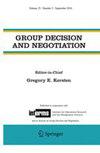复合共识构建过程:容许会议分析与折衷选择探索
IF 2.5
4区 管理学
Q2 MANAGEMENT
引用次数: 0
摘要
在解决当今的社会问题时,有必要确定所有利益相关者都能接受的解决方案,并合作应用它们。传统的“允许会议分析”技术通过数学分析得出了一个在每个人允许范围内的共识选择;然而,它往往偏向于群体中的大多数人,这使得当冲突发生时很难达成共识。为了支持共识构建(这里定义为不是每个人都拒绝的可接受的妥协),我们开发了一个复合共识构建过程。开发的流程通过将可允许的会议分析与新的“折衷选择-探索”技术相结合来解决这个问题,当可允许的会议分析无法做到这一点时,该技术提出了一个可同意的选择,强调每个人之间的公平和平等。当允许的会议分析和妥协选择探索都不能达成共识时,提供一个工具来在它们提供的选择中创建一个被异化的选择。试验结果证实,容许性会议分析和妥协选择探索对于得出共识选择是足够有用的。此外,我们发现妥协选择探索的特点是它能够推导出控制妥协与公平之间平衡的选择。我们提议的建立协商一致意见的综合办法可以广泛适用于各种情况,从市政当局和社区的地方问题到诸如环境保护和人权问题等国际问题。它还有助于发展数字民主和平台合作主义。本文章由计算机程序翻译,如有差异,请以英文原文为准。
Composite Consensus-Building Process: Permissible Meeting Analysis and Compromise Choice Exploration
In solving today's social issues, it is necessary to determine solutions that are acceptable to all stakeholders and collaborate to apply them. The conventional technology of"permissive meeting analysis"derives a consensusable choice that falls within everyone's permissible range through mathematical analyses; however, it tends to be biased toward the majority in a group, making it difficult to reach a consensus when a conflict arises. To support consensus building (defined here as an acceptable compromise that not everyone rejects), we developed a composite consensus-building process. The developed process addresses this issue by combining permissible meeting analysis with a new"compromise choice-exploration"technology, which presents a consensusable choice that emphasizes fairness and equality among everyone when permissible meeting analysis fails to do so. When both permissible meeting analysis and compromise choice exploration do not arrive at a consensus, a facility is provided to create a sublated choice among those provided by them. The trial experimental results confirmed that permissive meeting analysis and compromise choice exploration are sufficiently useful for deriving consensusable choices. Furthermore, we found that compromise choice exploration is characterized by its ability to derive choices that control the balance between compromise and fairness. Our proposed composite consensus-building approach could be applied in a wide range of situations, from local issues in municipalities and communities to international issues such as environmental protection and human rights issues. It could also aid in developing digital democracy and platform cooperativism.
求助全文
通过发布文献求助,成功后即可免费获取论文全文。
去求助
来源期刊

Group Decision and Negotiation
Multiple-
CiteScore
5.70
自引率
6.70%
发文量
32
期刊介绍:
The idea underlying the journal, Group Decision and Negotiation, emerges from evolving, unifying approaches to group decision and negotiation processes. These processes are complex and self-organizing involving multiplayer, multicriteria, ill-structured, evolving, dynamic problems. Approaches include (1) computer group decision and negotiation support systems (GDNSS), (2) artificial intelligence and management science, (3) applied game theory, experiment and social choice, and (4) cognitive/behavioral sciences in group decision and negotiation. A number of research studies combine two or more of these fields. The journal provides a publication vehicle for theoretical and empirical research, and real-world applications and case studies. In defining the domain of group decision and negotiation, the term `group'' is interpreted to comprise all multiplayer contexts. Thus, organizational decision support systems providing organization-wide support are included. Group decision and negotiation refers to the whole process or flow of activities relevant to group decision and negotiation, not only to the final choice itself, e.g. scanning, communication and information sharing, problem definition (representation) and evolution, alternative generation and social-emotional interaction. Descriptive, normative and design viewpoints are of interest. Thus, Group Decision and Negotiation deals broadly with relation and coordination in group processes. Areas of application include intraorganizational coordination (as in operations management and integrated design, production, finance, marketing and distribution, e.g. as in new products and global coordination), computer supported collaborative work, labor-management negotiations, interorganizational negotiations, (business, government and nonprofits -- e.g. joint ventures), international (intercultural) negotiations, environmental negotiations, etc. The journal also covers developments of software f or group decision and negotiation.
 求助内容:
求助内容: 应助结果提醒方式:
应助结果提醒方式:


